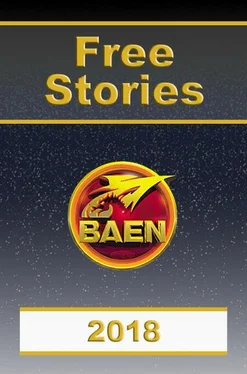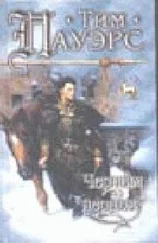2HRC518.
Vickery memorized it. He was about to look at the second hand of his watch and begin apologizing to the people around him in average time, when he saw a figure emerge from the apartment’s open door.
It was the jet-black silhouette of Scout, and it began trudging away on the aimless course that would, in a few minutes of this interval of the past, lead her to the clearing in which Vickery then sat reading his book.
Vickery watched the woman-shape reach the sidewalk and start away north, and then he winced as voices and colors crashed in on him.
“-- my foot, asshole,” someone was yelling at him, and someone else punched his shoulder and said, “You got a problem, dickhead?”
“I’m sorry,” said Vickery as he backed out of the group, “I’ve got bad vision, didn’t see you, sorry.”
Several of the people turned to frown back at him as he retreated toward the fence, but the spectacle on the other side of the street soon reclaimed their attention, and Vickery hurried away north on the sidewalk.
He pulled his cell phone out of the inner pocket of his windbreaker. It was a burner phone, and if he called the police with it, he would have to throw it away, and a new one would cost fifty dollars; but he sighed and flipped it open and tapped in 911. It was little enough, but it was all he could do for her.
Soon a woman’s voice answered: “911, what is the location of your emergency?”
“An apartment building on Hoover, just south of the 10 overpass,” said Vickery, “a woman was shot there about twenty minutes ago, there’s cops there now. But I was across the street, and a guy ran out of that apartment right after the shots were fired, blond or white-haired, in a dark sport coat, and he got into a light-colored late-‘90s Saturn and drove away south, license plate 2HRC518. I—I think his name’s Eddie.”
“You know him? Do you know the woman?”
Vickery shut the phone. I never knew her, he thought, but we both liked the book she called It’s A Sin to Kill A Mockingbird .
He thought of hurrying back to the clearing beside the freeway, but he knew that her ghost was gone now, carried away in the current generated by the ever-moving free will charges in the rushing freeway lanes.
Rest, Scout, he thought, in that peace that sustains you when everything’s gone wrong.
He looked ahead at the many-colored signs already visible at the Washington and Hoover intersection, and he hoped he’d be able somewhere to get a big mug of coffee, bitter as wormwood and black as a ghost lost forever in the past.
Steve White
Out of the Vortex
At a distance of thirteen and a half astronomical units, Tau Ceti—a smaller star than Sol, with only a little more than half its luminosity—provided very little light. But that light was sufficient to enable Commander Ian Takeda, RSN, gazing at the viewcreen in HMSS Hawke ’s bridge, to glimpse the shuttle that had departed the hollowed-out asteroid that was Washington Station.
“Here he comes, Captain,” said Lieutenant Commander Caitlin Malone, the first officer, unnecessarily.
“So I see, Number One,” said Takeda with a nod. He was a tall, slender, aquiline-featured man, the Japanese half of his ancestry manifested mostly in high cheekbones and dark eyes. He was also quite young for his rank, and Hawke was his first command. She wasn’t one of the mighty dreadnoughts of space—the first through third rate ships, in terms of the old rating system that the Royal Space Navy had resurrected from the age of sail to avoid confusion with modern wet-navy ship types—but rather a Benbow class fifth rater, suitable for cruiser-type duties. But Takeda hadn’t yet outgrown a thrill of pride whenever he saw her, with her sleek aerodynamic lines suitable for atmospheric transit, and the flag that adorned her flank—the Union flag of the Britannic Federal Empire.
At the moment, however, that pride was in abeyance, as was everything except disgruntlement with the mission he had been assigned.
Divining the skipper’s mood, Malone essayed a pleasantry. “Being a New American, I’ll wager he’s relieved to get off Washington Station. I mean, a name like that… ”
Takeda smiled briefly. “I’ve been assured that he isn’t one of the diehards.”
Malone turned thoughtful. “I suppose it wasn’t really the most tactful possible choice of a name for the Navy’s base in this system.”
Takeda said nothing. He himself was from the Viceroyalty of North America—specifically, from the Dominion of Oregon that occupied the Pacific coast between Spanish California and Russian Alaska. (His paternal grandparents had been among the refugees who had flooded Oregon when Japan had been bloodily incorporated in Greater China.) So he understood what the first officer meant. Where he came from, George Washington was revered for having accepted the rapprochement that had resolved the First American Rebellion five centuries earlier, and then having suppressed the rebel holdouts led by Benedict Arnold. But New America, the habitable lesser component of the binary planet system occupying Tau Ceti’s fifth orbital position, had been colonized by irreconcilable North American separatists. Arnold was their great historical hero, and they ranked Washington with Judas Iscariot.
And now, Takeda thought, instead of doing the kind of work my ship is intended to do, I’ve been ordered to chauffeur some New American scientist out to the middle of nowhere .
“Well,” he sighed, “he’s almost here. I’d better go down and meet him. You have the conn, Number One.”
* * *
Elijah Willett, Ph.D., was a slight, middle-aged man of no great stature, with a narrow face and mild, pale-blue eyes. A couple of assistants followed him out of the airlock, bearing luggage and crates of apparatus.
“Permission to come aboard, Captain?” asked Willett with a smile. “Is that the correct formula?”
“Close enough.” Someone, thought Takeda, must have told him that a ship’s commanding officer was addressed as “Captain” even if he was a mere commander in rank. They shook hands.
There was, Takeda reflected, always a certain awkwardness in dealing with New Americans, given their anomalous relationship with the Empire. Their ancestors had traveled to Tau Ceti in suspended animation, their fifty-year voyage humankind’s first and only slower-than-light interstellar colonizing expedition. They had arrived at their destination a little over a century ago, only to find that while they had slept their way to the stars the Bernheim Drive had been invented on Earth. The discovery that the Empire they had sought to escape was already established in their promised land was something from which they still had yet to recover. However, the Empire had been quite reasonable about it, allowing them to set up their colony and permitting it a unique semi-autonomy, with a standing offer (never accepted) of Dominion status. It was an arrangement the New Americans were able to live with, save for the Sons of Arnold, an organization which advocated full independence… and which, as had recently come to light, included an extremist faction prepared to go beyond mere advocacy.
“I’m under orders to afford you every possible assistance compatible with the safety of my ship and crew,” said Takeda. “But I must say I’m somewhat in the dark as to the purpose of this expedition of yours.”
Willett’s blue eyes sharpened. Takeda had never pretended to be a master at concealing his emotions, and he suspected the scientist had detected his lack of enthusiasm for this mission. But when he spoke, his voice was mild.
“Well, Captain, I’ll do my best to enlighten you. If we could go somewhere…”
Читать дальше








![Тим Пауэрс - Последние дни. Том 2 [litres]](/books/393813/tim-pauers-poslednie-dni-tom-2-litres-thumb.webp)
![Тим Пауэрс - Последние дни. Том 1 [litres]](/books/394090/tim-pauers-poslednie-dni-tom-1-litres-thumb.webp)
![Тим Пауэрс - Последний выдох [litres]](/books/402145/tim-pauers-poslednij-vydoh-litres-thumb.webp)